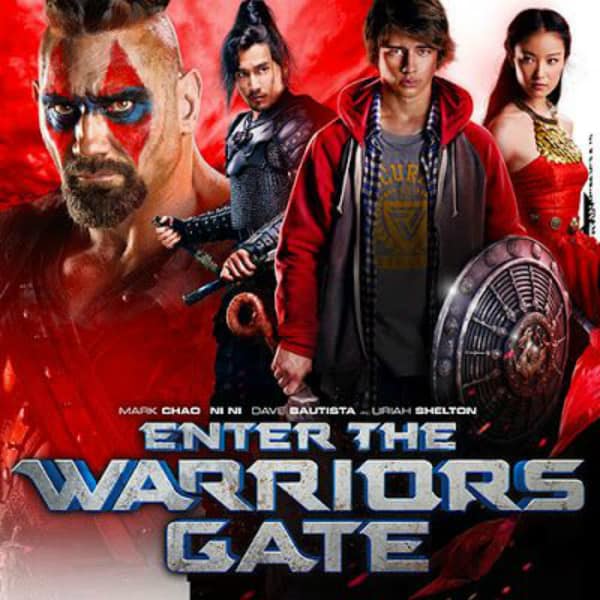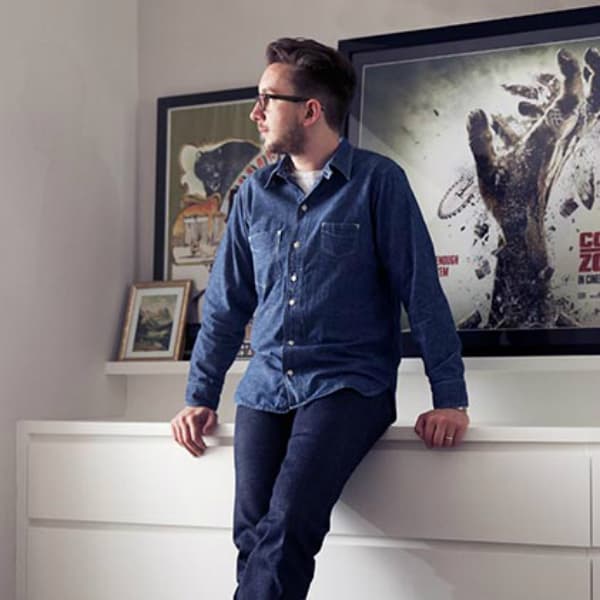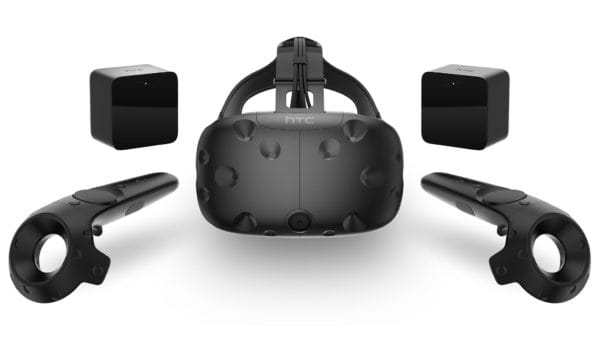
Thanks to Katrina Wan PR we were able to not only receive a special screener of the film Enter the Warriors Gate, but also conduct a 20 minute interview with the director of the film, Matthias Hoene.
Enter the Warriors Gate released to theaters on Friday, May 5, 2017. Uriah Shelton plays the main character Jack Bronson in the film. Enter the Warriors Gate sees Jack Bronson, who’s quite talented at video games, be transported via magic box to China. There, he must save the princess from the evil ruler played by Dave Bautista.
The film itself is written by Luc Besson and Robert Kamen. It also stars Mark Chao and Ni Ni.
Here is a trailer for the film…
https://youtu.be/o_163DwNZB4
The film is also available to order through DIRECTV, most video on-demand services, such as Google Play, I-Tunes, Vudu, Youtube and digital HD.
If you’d like to listen to an audio version of the interview, you can listen to it through the embedded player at the bottom of this post, or find Video Games 2 the MAX on I-Tunes, Youtube or any other podcast catcher and listen to it through there as well.
The following is the full interview Daniel Anderson and myself conducted with Matthias Hoene.
W2Mnet Interview: Matthias Hoene

Question 1: Given how our website is pretty heavy into video games, and this movie is about how a person is taken into a video game, are you a general fan of video games at all?
Matthias Hoene: “Yes. Absolutely. I started by trying to program my own games with my brother on Commodore 64, and then the Amiga, and then I went onto PC gaming. And then, onto the PlayStation 1 and then on to Playstation 4 at the moment.”
Question 2: What type of games do you like playing?

Matthias Hoene: “The last game I played was Call of Duty Black Ops 3. Before that was Fallout 4. I like shooters and when I have the time, open world games, but nowadays I don’t have that sort of time for them usually.”
Question 3: Have you tried the PlayStation VR headset at all?

M: “You know, I tried the HTC Vive. I did a few games on that. Not the PlayStation one yet, but I haven’t gotten the PS4 Pro and I wanted to wait for that. It’s pretty amazing though isn’t it I think? the virtual reality headset, The best thing you can think of for any zombie survival shoot-em-up. So scary and immersive isn’t it? You have these things creeping up behind you, and swirl around, and attack them, I find it quite impressive. I think personally, one more generation for higher resolution, that’s my take away.”
“Not so much for movies I think. I don’t know if it is going to work for movies, but for games, I think it is perfect. It becomes more like an amusement park ride than a story that you are being told by, from the framing of a storyteller. I wouldn’t mind being 360 in side a WWE wrestling ring.”
Question 4: Having Dave Bautista on set had to have been kind of cool. Are you a fan or wrestling at all? Is that a reason you cast him or was it more for his acting work?

Matthias Hoene: “Well, I have to confess I stopped watching wrestling about 10 years ago. I was aware of him, through some of the matches. I actually spoke to him before he was in Guardians of the Galaxy and he was in a movie called Man with the Iron Fist, actually. When he came up, I had this amazing interview with him over Skype where he said to me [in a growling voice] Matthias, I really like the role of Arun, because he is, I see him as a funny guy and you know what? When I go to an audition, all people ask me to do is to roar and growl and shout and I’m not like that. I’m like a really nice lovely guy and I want to play a role like that [end growling voice].”
“And I wanted to laugh because, of course, he is sort a physical presence with a deep booming voice, at the same time he has a really funny glint in his eyes and he is really playful. On set I realized that he is also the loveliest person you could imagine. When I spoke to him it was sort of one of those moments when you know, okay, he is perfect. And then two weeks later Guardians of the Galaxy came out, and that kind of, obviously, didn’t hurt. But I kind of knew beforehand that if I was lucky enough he was the man to do it. And he was very accommodating. He came to join us right after, like the day after, he finished shooting Spectre. He moved heaven and earth to make sure he could join us on the film and make the schedules work and I really appreciate that, he was great.”
“In terms of the film itself, when I got the script, and as a European filmmaker had only done a sort of low budget film ( Cockneys vs. Zombies) and then you get a script written by Luc Besson and Robert Kamen, you start getting a little excited because Robert Kamen wrote the original Karate Kid and did Fifth Element together with Luc and films like Taken, I was sort of very excited about it and what I really appreciated was the slightly 90’s throwback narrative that reminded me of The Last Starfighter and the original Karate Kid and those Asian movies I grew up watching like Chinese Ghost Story and House of Flying Daggers which are really cool martial arts movies. I always wanted to do a martial arts movie, I did martial arts as a teenager myself, I always thought, how much fun would it be to do a martial arts movie like this. But, then I also thought also, as a German who lives in London the pitch of wanted to do a martial arts movie would only work with two western producers. One would be Quentin Tarantino and the other would be Luc Besson. I was very excited when I got the script because it was a chance to make a boyhood dream come true.”
“To me, this felt like the comedy in the script and the innocence carries the story through with the bighearted emotion you can see unfold in all the characters. That was key for me. I felt, maybe it isn’t the most original premise you can think of, but I like the sentiment and warmth of the story and then, I also liked the action sequences really. I remember when I kinda showed Luc the cut of the film he went, ‘OH, I forgot there were so many action sequences in the script.’ And I was like, ‘yeah, you let me do that, its great.’ It was great when you have a producer who doesn’t cut half the action sequences when you get into budgeting, so it was kind of exciting.
Question 5: I thought that was one of the things that you nailed, were the fight scenes in the film. I noticed Uriah Shelton has a taekwando background. Did the actors do their own stunts? Did that help? How hard was it to shoot those sequences?

Matthias Hoene: “I worked with a really great Hong Kong action choreographer named Tony Ling who was second in command on Kill Bill. With his team, we worked together to create those action sequences. What was amazing about Uriah Shelton, who is still a very young actor, when he walked into the room, in the audition, and saw his easygoing charm and his cheekiness, and he is incredibly good looking, but humble and fun I had already cast him in my mind. Only at the end of the session did he say, “Oh by the way, did you know I have a black belt in taekwando.” And I was like “yes, perfect.” Because, in the end it turned out that he was better than his stunt double at almost everything basically. He did all the stunts himself, and he was amazing. It makes a big difference because you can hold the shots longer and feel what the performer is feeling while they are fighting.”
“I think, for example, it was Ni Ni’s (she play’s the princess in the film), first martial arts movie and she did a lot of martial arts herself, but then when the guys go into an action setup and get a bruise or something it is like ‘yeah a bruise, no problem.’ But when someone like Ni Ni, who’s a perfect porcelain doll of a person, when she broke a fingernail on a piece of armor punching someone, I would be so worried about her. Like, ‘oh my god, you broke a fingernail’ It was terrible because she’s so perfect. For example, on some scenes she would have an action double doing the more dangerous things for safety, and all of that. It’s always, of course, better to have all the action done by the actors themselves. And that’s why people like Jackie Chan, who used to do that, became so famous. A balance is also doable I guess.”
“The way I’m approaching it really, I tried to primarily make every scene a storytelling scene. Every action scene should have a beginning, a middle, and an end. You should always know what your protagonist is facing off against, and then to be with him and feel with him, as he figures out how to overcome the obstacle thrown his way. Whether that’s a mutated monster or if it’s three samurai chasing at him. You know, that’s to me the key, as long as you understand the geography, and what your protagonist is feeling, and how he’s getting around the attack, that to me is a successful action sequence. In modern action, that’s difficult to hit now where. Some audiences are very used to fast cutting and often it is too fast and you lose a sense of how a fight might work. But if you do a slow fight without cutting sometimes audiences find them too slow and they don’t feel the impact enough. I tried to find a balance between the two, where, as much as possible, I tried to keep the geography clear, feel what everyone’s feeling and also get a good pace to the action sequences.”
Question 6: Were there any funny stories you can relate from the filming of the movie? Anything that kind of stands out and makes you laugh as you think back on it?
Matthias Hoene: “Yeah… Let me see. Ni Ni’s broken fingernail really did bring me to tears almost. Uriah made us laugh all the way through. He had an injury on the shoot. He was air guitaring in his hotel room and slipped and had a bruised foot. It was medium funny. Overall, It was just an amazing opportunity for all of us to go work with a French team, an American writer, a German Londoner, going to China with a huge Chinese team where you can make movies on a scale that we don’t really do anymore in the west.”
“For example, one day, I discovered a whole department of almost 20 people working on the film and I didn’t even know what they were doing. My stylist told me they were the wig department. All they did was make beards and fake wigs for all the background extras. They made 900 of those I think. If you were to buy those in London, they would be $5,000 a piece, but we just had them lying everywhere. It was really special. And the same, with the armor, where you could just get everything made out of steel. The Asian team were so wanting to please and wanted to do great stuff. They took all my designs and made this great Roman armor for the Black Knight at the beginning, and made it incredibly detailed and incredibly beautiful. But then someone decided it would be cool to have a Mexican mural on the side of the Roman antique helmet. I said, ‘Guys how can you have Mexican murals on the side of a Roman antique helmet?’ They just looked at me puzzled, but then the next day it was changed. They were very flexible and worked overnight to get it done.”
“That was really impressive to work with teams that were so fast moving and ambitious. They were trying to get our cultures to come together. I hope more of these type of projects will still happen. At the moment it is a difficult process where people are trying to figure out, if it actually works to make entertainment in co-production. You look at The Great Wall and Ghost in the Shell, there was a little controversy around those films. But I think those conversations are very good because it will encourage everyone to try better next time, and educate our audiences to try something they wouldn’t have otherwise have seen. Hopefully, good things will come from this process. Artistically good things and entertaining things. It’s certainly an interesting time to be making films.”
Question 7: There is a part in the film where the princess (Ni Ni) is with Uriah Shelton’s character in the mall and the first kind of American food she eats is ice cream. Do you have a favorite ice cream flavor?

Matthias Hoene: Yes, well, I would say, Cookies and Cream all the way. Normally, it would be Haagen-Dazs cookies and cream. You know, actually, in Berlin, when I was younger there was an ice cream parlor they had a special Smurf flavored ice cream. It was smurf (blue) colored and was called Smurf ice cream. I thought it was interesting to eat Smurf ice cream. I don’t know if anyone else in the world ate that, but that was one I ate growing up.
Question 8: You were talking about how the co-productions went. Was it easier or more complicated involving people from different parts of the world?

Matthias Hoene: It is very complicated. First of all the language barrier is very complicated. Even the French sometimes didn’t understand English, and then the Chinese crew too of course. You end up talking with pictures mostly. In terms of casting, to find a cast that can speak English and Chinese and can do kung fu or is American and can do fighting, to work that out is really complicated. There aren’t so many actors and crew to choose from who can speak both languages and understand both cultures, it was not very easy to make. For example, it would have been a lot easier to make an all Chinese movie in Chinese language, because then the choice of actors would have been much easier and more straight forward. I thought at one point doing a 50/50 Mandarin/English version, but that was also too complicated. Then you really cant show it properly in the US, so, yeah, complicated. [laughs]
Question 9: Is this something you would be interested in doing it again with all the complications? Or is this something that was more difficult than what you thought?
Matthias Hoene: It is really the most difficult thing you could think of. That’s the reason why there have been so very few co-productions that have succeeded, and produce a good film by the end of it. I really liked being in China. I loved working with the team there and Tony Ling the fight choreographer. I could see myself doing a martial arts movie there, I have been thinking about maybe a really tough R-rated martial arts movie in Asia, that would be really fun, as a next project.
(After this, the interview ends, we exchange thank you’s and Matthias gave us a wonderful compliment on the website as well, which we really appreciate.)
We’d like to thank again, Matthias Hoene, Katrina Wan PR and everyone else that helped make the interview possible. We greatly appreciate this opportunity.
The audio version of the interview is embedded below…
